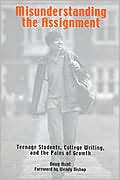List Books » Misunderstanding the Assignment: Teenage Students, College Writing, and the Pains of Growth
Category Books
- Fiction Books & Literature
- Graphic Novels
- Horror
- Mystery & Crime
- Poetry
- Romance Books
- Science Fiction & Fantasy
- Thrillers
- Westerns
- Ages 0-2
- Ages 3-5
- Ages 6-8
- Ages 9-12
- Teens
- Children's Books
- African Americans
- Antiques & Collectibles
- Art, Architecture & Photography
- Bibles & Bible Studies
- Biography
- Business Books
- Christianity
- Computer Books & Technology Books
- Cookbooks, Food & Wine
- Crafts & Hobbies Books
- Education & Teaching
- Engineering
- Entertainment
- Foreign Languages
- Game Books
- Gay & Lesbian
- Health Books, Diet & Fitness Books
- History
- Home & Garden
- Humor Books
- Judaism & Judaica
- Law
- Medical Books
- New Age & Spirituality
- Nonfiction
- Parenting & Family
- Pets
- Philosophy
- Political Books & Current Events Books
- Psychology & Psychotherapy
- Reference
- Religion Books
- Science & Nature
- Self Improvement
- Sex & Relationships
- Social Sciences
- Sports & Adventure
- Study Guides & Test Prep
- Travel
- True Crime
- Weddings
- Women's Studies
Misunderstanding the Assignment: Teenage Students, College Writing, and the Pains of Growth » (1st Edition)

Authors: Douglas Hunt
ISBN-13: 9780867095395, ISBN-10: 0867095393
Format: Paperback
Publisher: Heinemann
Date Published: September 2002
Edition: 1st Edition
Author Biography: Douglas Hunt
Douglas Hunt is an associate professor of English at the University of Missouri-Columbia where he has served as the director of composition and helped launch an innovative writing-across-the-curriculum program. As both a teacher and an administrator, he has focused on undergraduate education and has edited several anthologies and guides for undergraduate English studies.
Book Synopsis
Many books take you inside a first-year composition class. Misunderstanding the Assignment takes you inside the minds of first-year composition students. Drawing on hours of videotaped interviews and copious ethnographic notes, Douglas Hunt has fashioned a nonfiction novel about learning and teaching writing. It traces the lives of six first-year students and their teacher from their first day together in a comp classroom through the end of the semester.
Hunt's book will excite theorists and ethnographers with its thick descriptions and offer questions worth considering to both new composition teachers and veterans. How do first-year college students experience their teachers? Their assignments? Their separation from home? How do these feelings support or inhibit learning? Are typical eighteen- and nineteen-year-old freshman developmentally ready for the demands of college? Hunt invites readers to draw their own conclusions from the multiple layers of information that he provides based on both his own research and the insights of composition theory, developmental psychology, and discourse theory.
Hunt frames the narrative as a modern novel, complete with a point of view that alternates among the individual students and their teacher, Rachel Palencia Harper. As you read, you will experience a typical composition class-with its new understandings and its many misunderstandings. In addition, a foreword by ethnographer Wendy Bishop situates the book within the discipline, and an afterword by Harper details how this experience changed her teaching. Finally, Hunt's own notes in the appendix describe his ethnographic processes and source materials.
Table of Contents
Subjects
 College Education
College Education  College environment -> United States
College environment -> United StatesEducation & Teaching
 Educational Levels & Settings
Educational Levels & Settings  College Education
College EducationEducation & Teaching
 Social & Political Aspects of Education
Social & Political Aspects of Education  Students & Student Life
Students & Student LifeEducation & Teaching
 Social & Political Aspects of Education
Social & Political Aspects of Education  Students & Student Life - College
Students & Student Life - CollegeEducation & Teaching
 Teaching & Teacher Training
Teaching & Teacher Training  Teaching - Classroom Planning & Management
Teaching - Classroom Planning & ManagementNonfiction
 All Nonfiction
All Nonfiction  Education - Social & Political Aspects
Education - Social & Political Aspects
